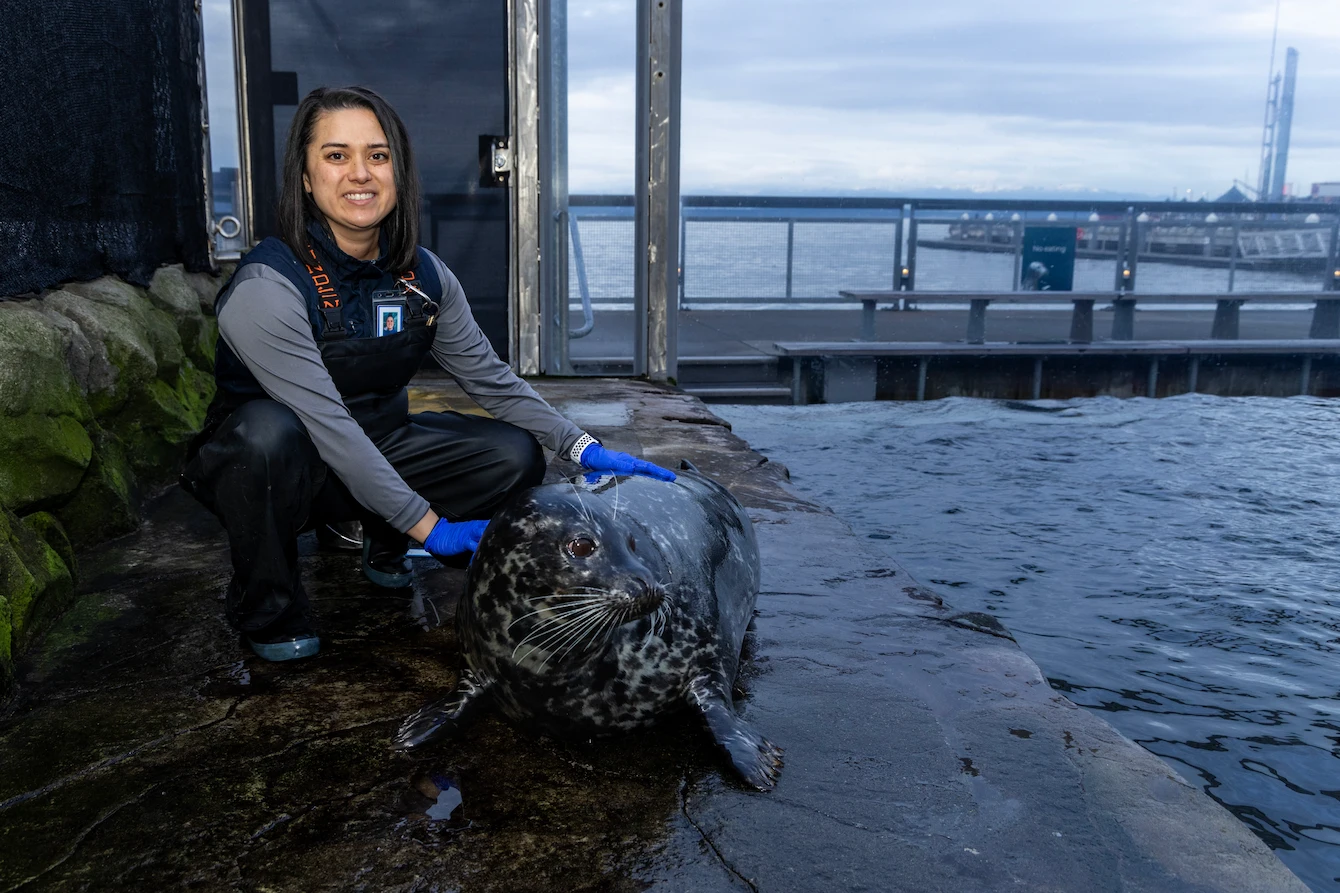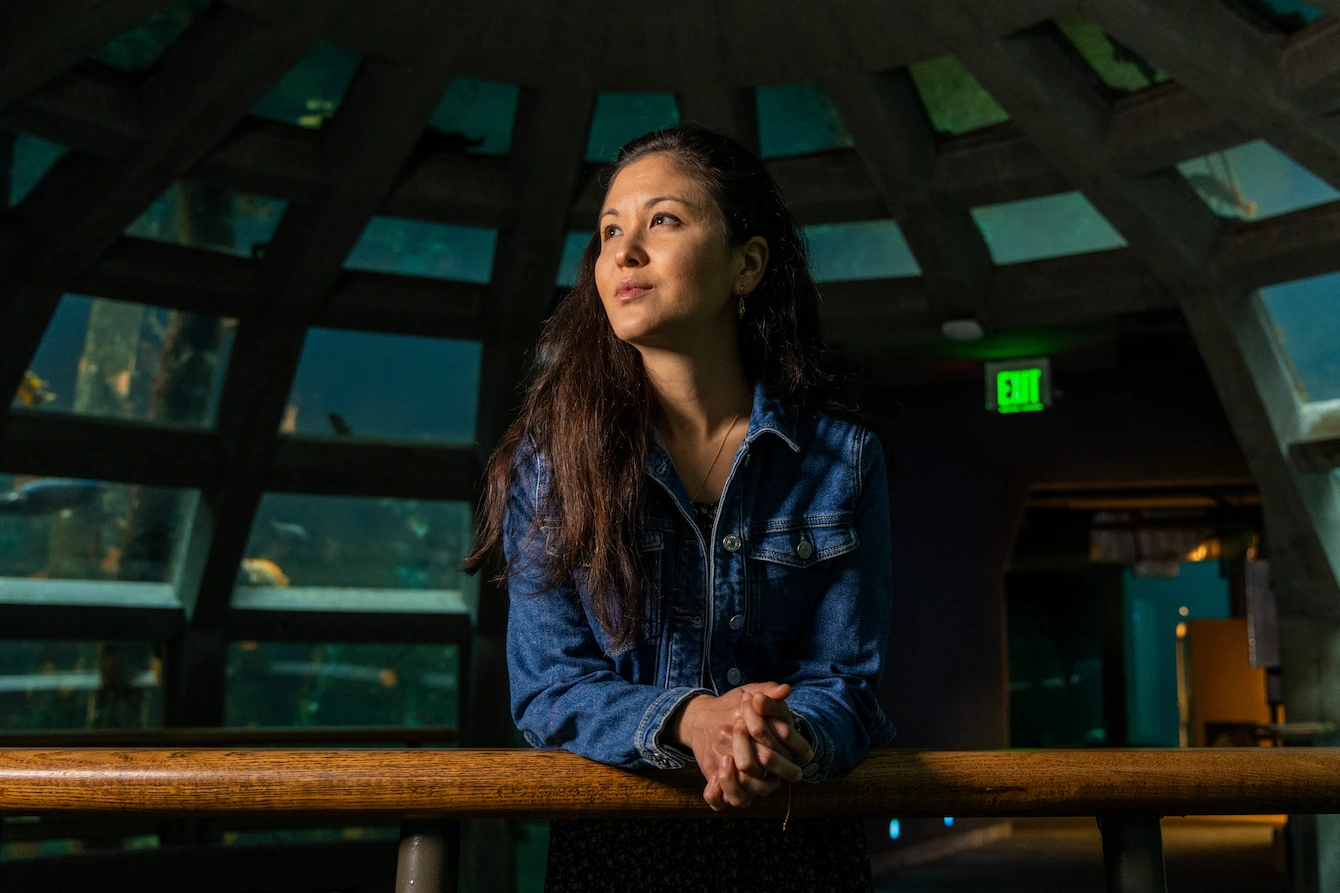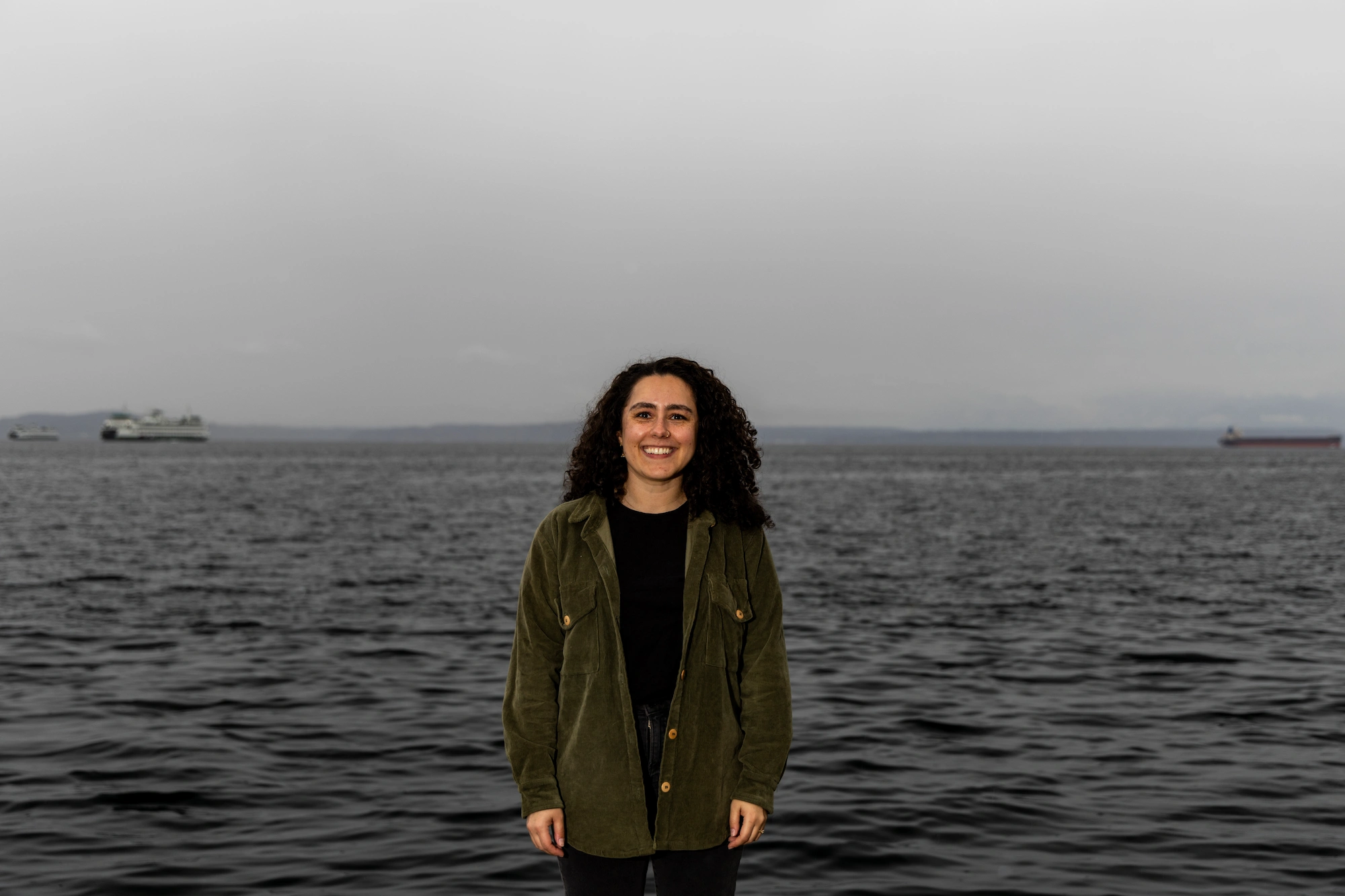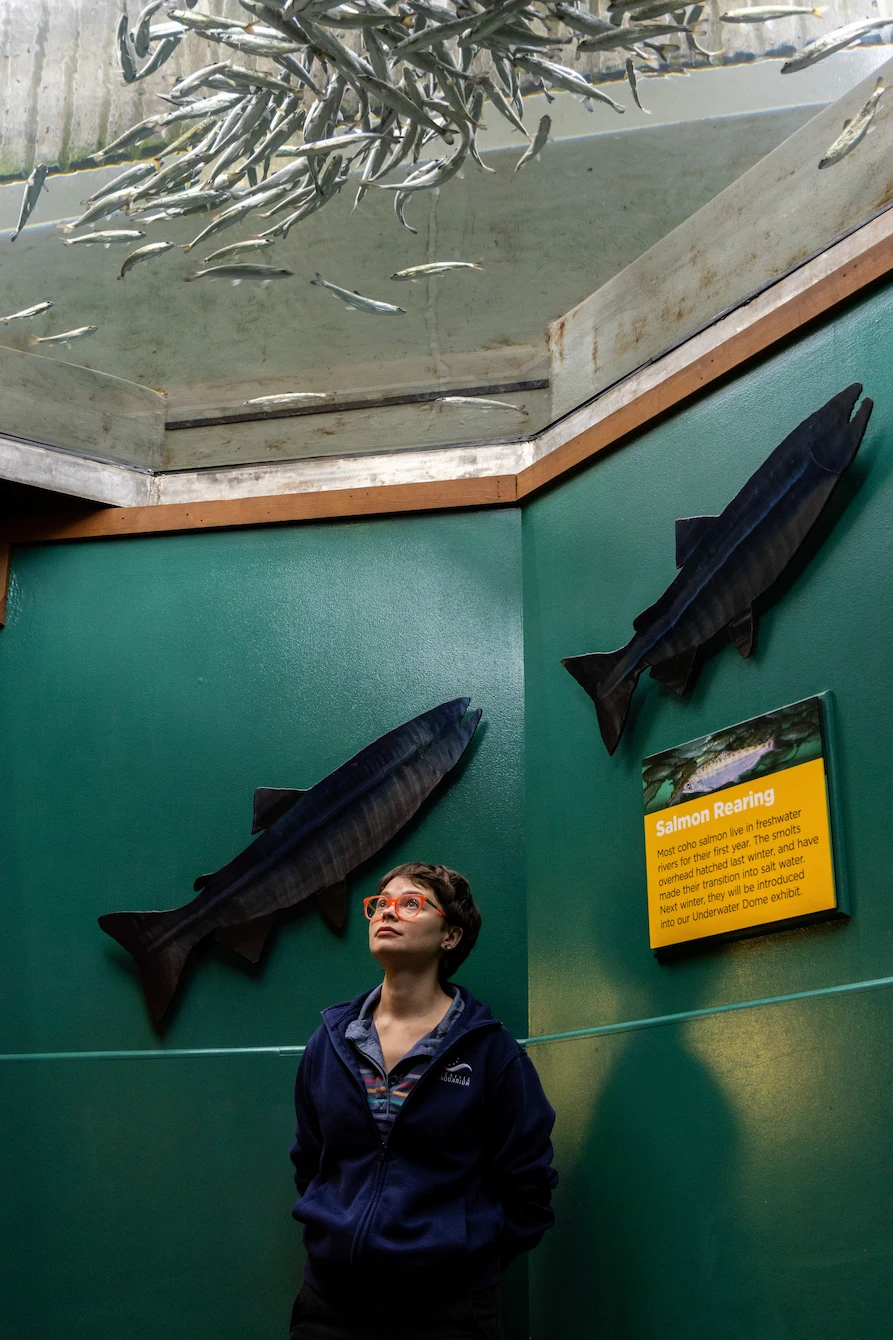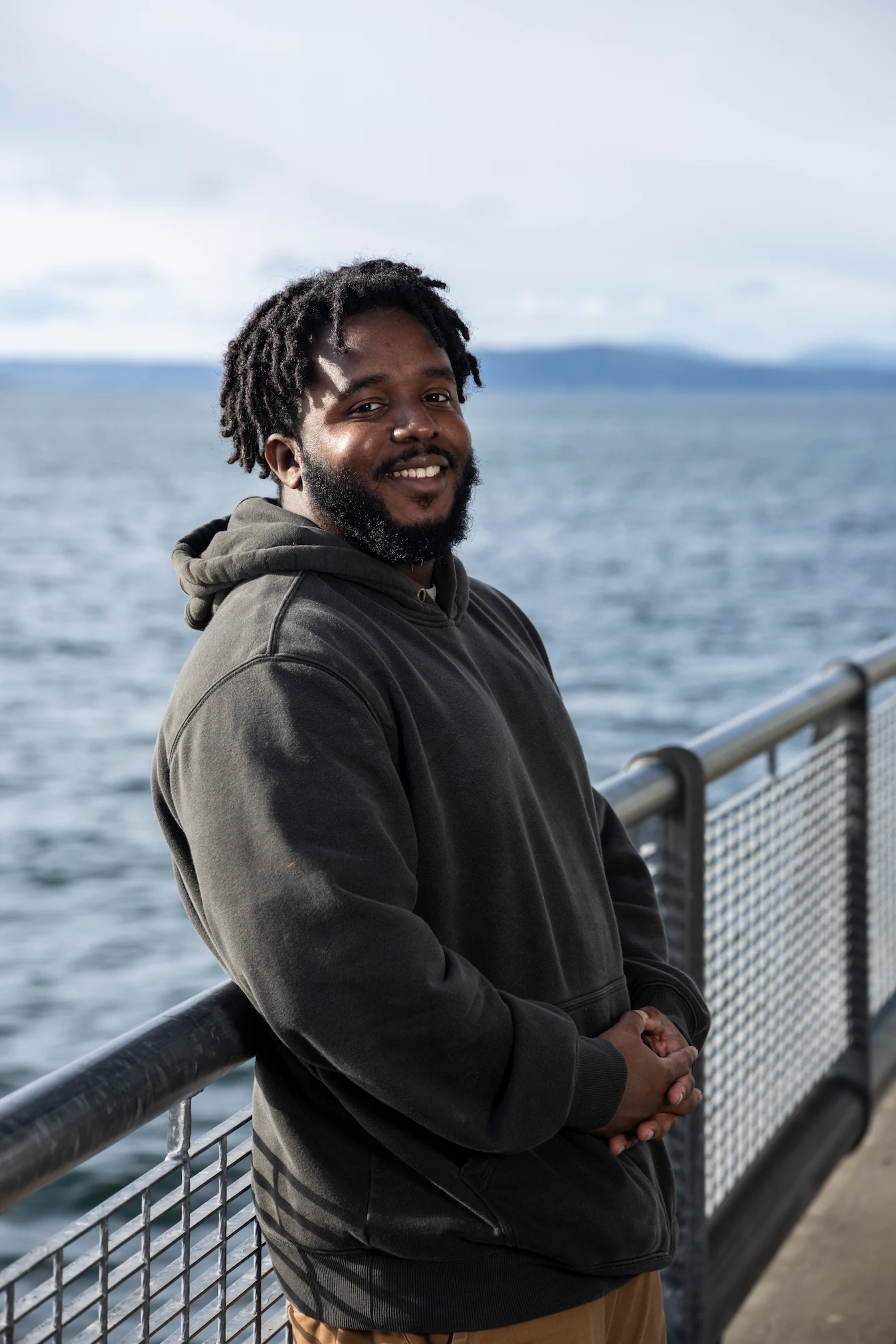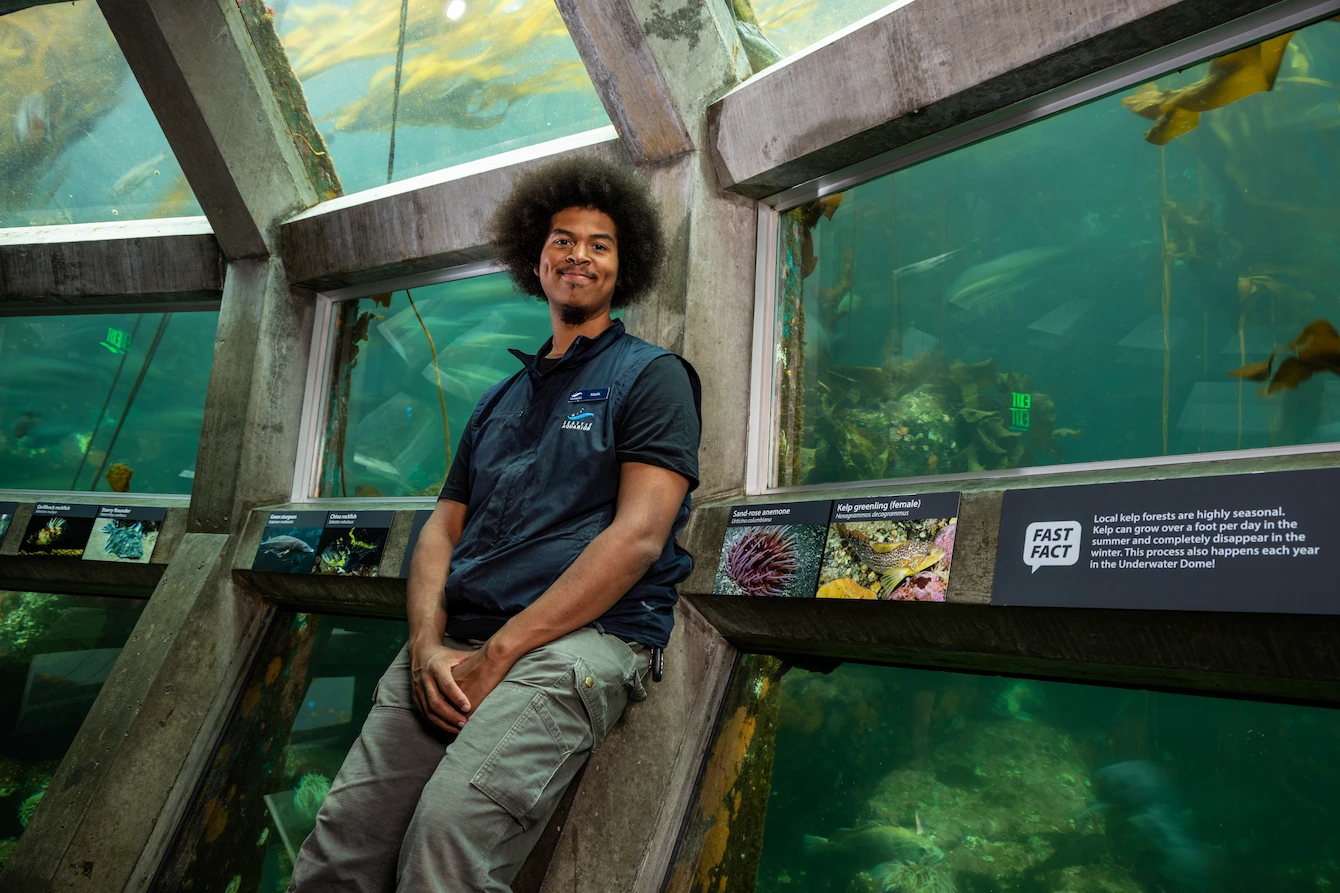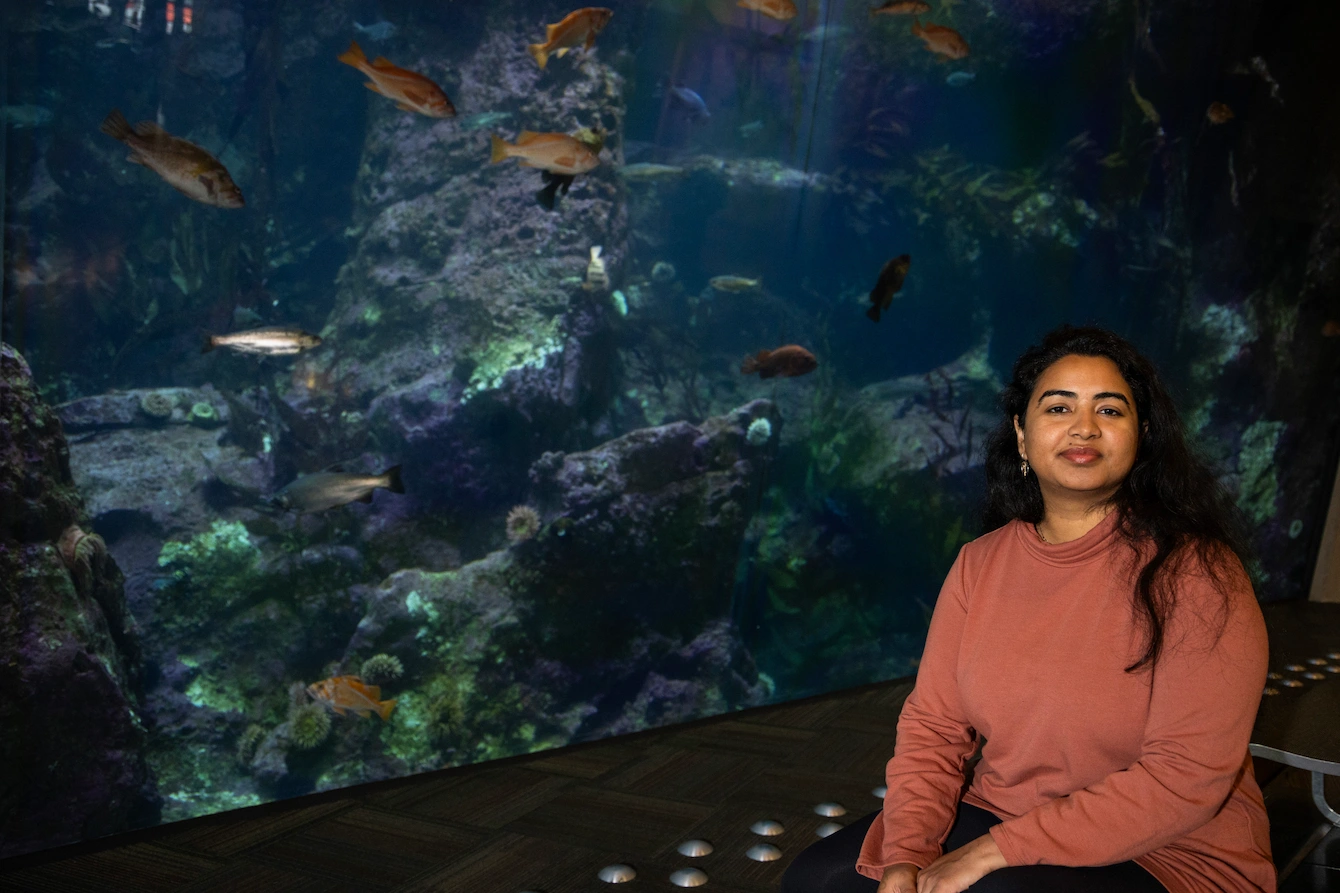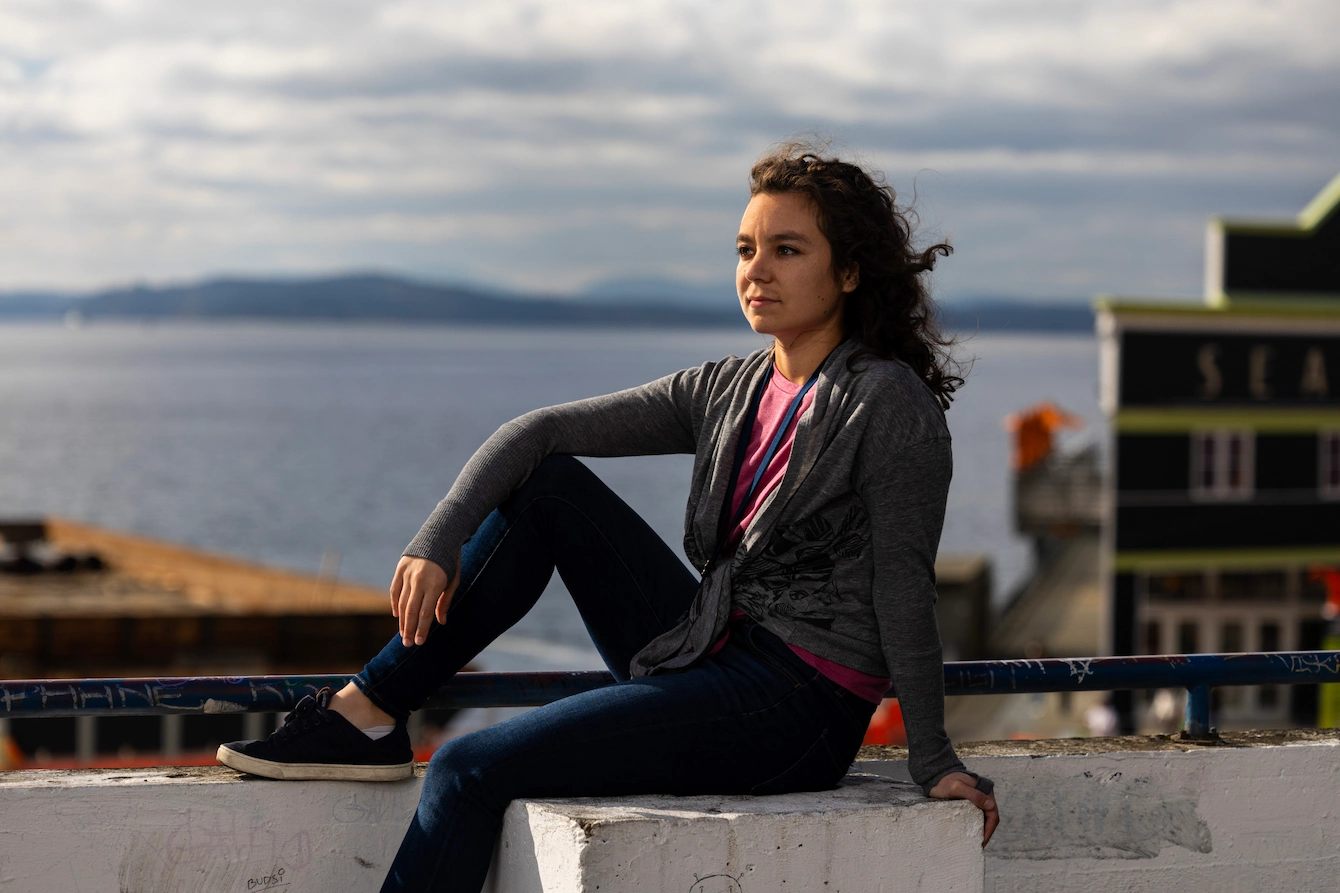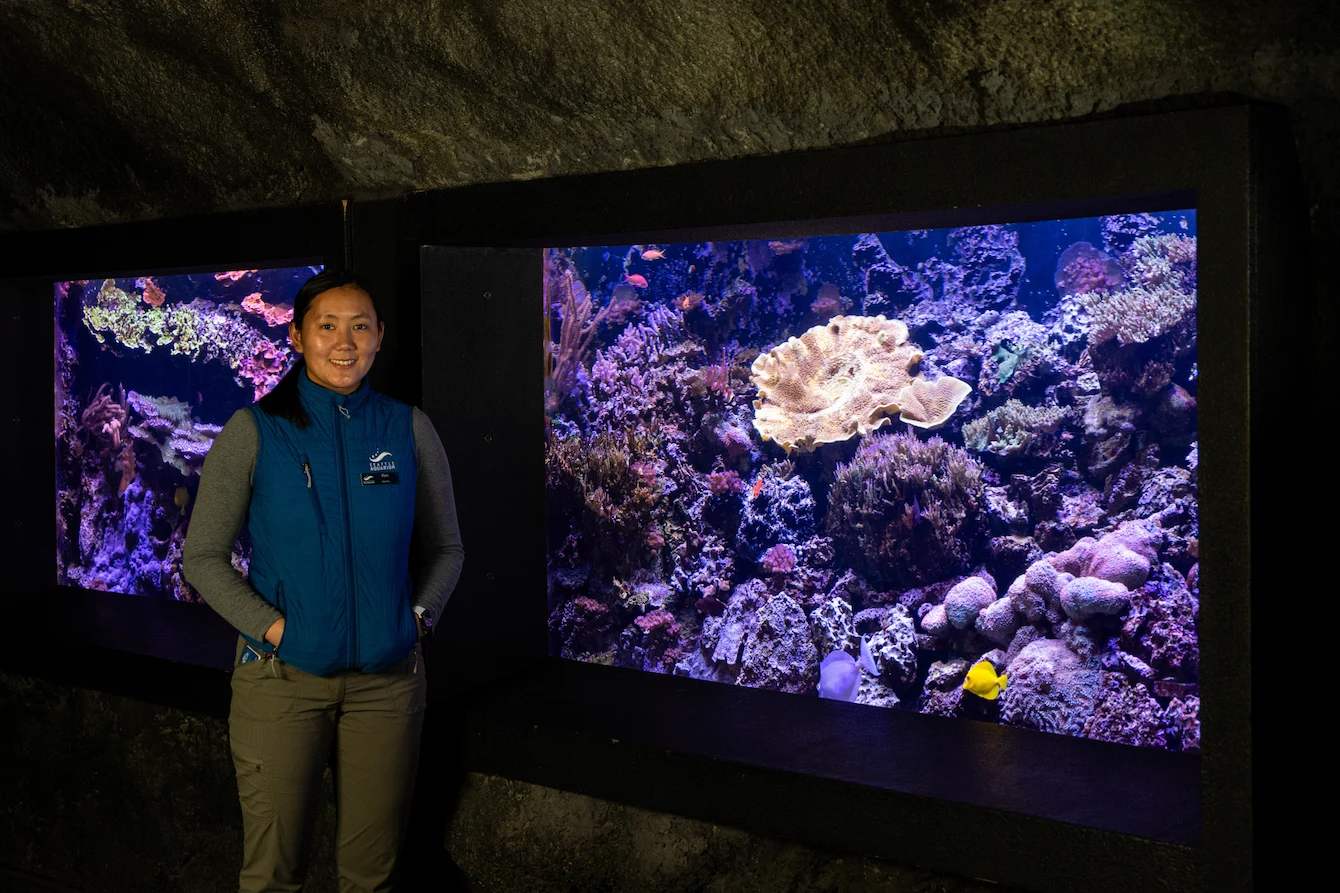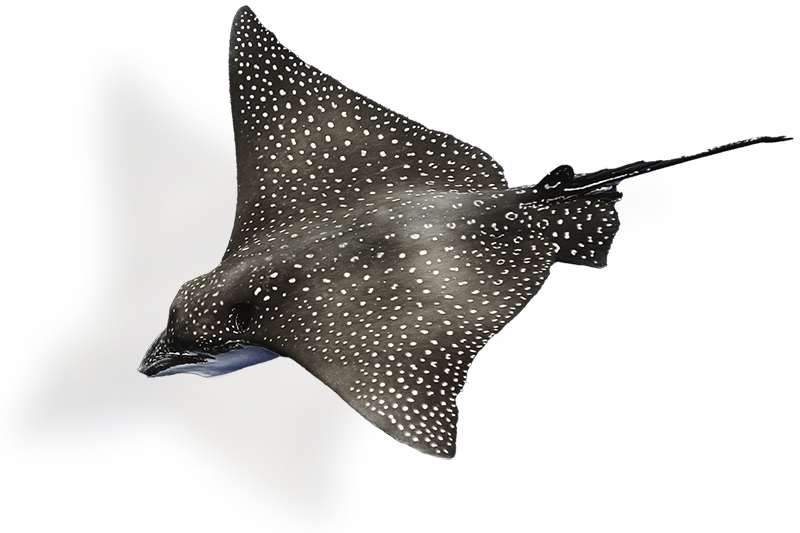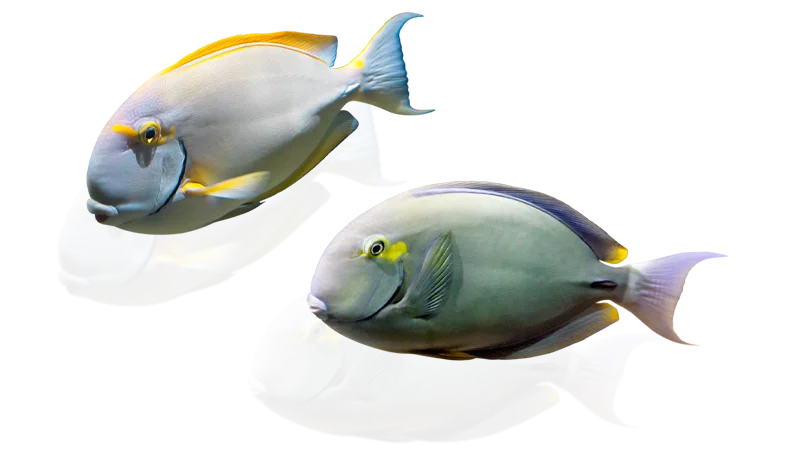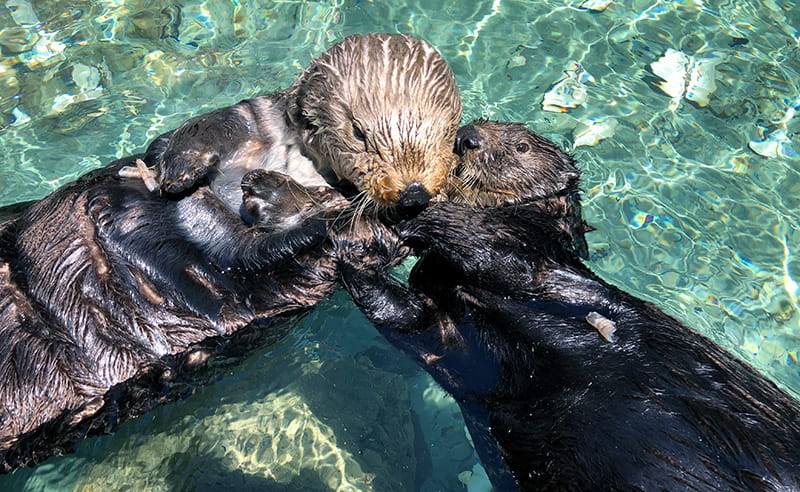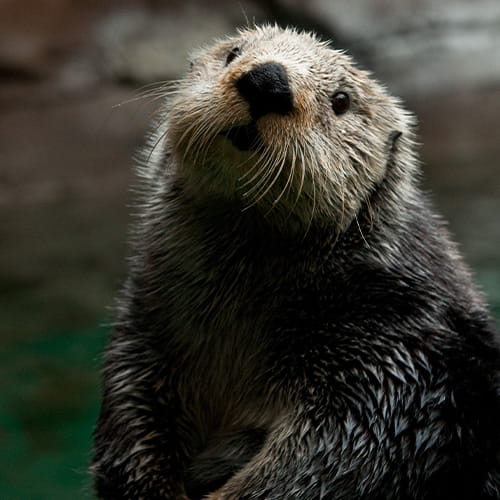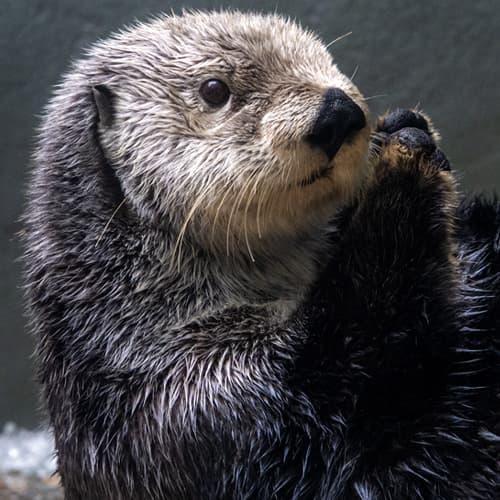Humans of the Aquarium is a story project about our interconnectedness and relationship with the natural world. Humans, like all living beings, depend on the ocean. This series features some of the humans who steward our mission, Inspiring Conservation of Our Marine Environment, and what inspires their work.
We’ll add new stories and portraits over time—please check back for more!
Aubrey Theiss
“I still remember the pivotal moment that changed my career’s trajectory toward animal care. In college, I was a geological oceanography major—I loved rocks!—and doing research on a ship in Alaska when I disembarked to retrieve some equipment from a reef. I was wading through the water when I noticed sea otters swimming by, black oystercatchers hopping around and being super vocal, and harbor seals resting on shore. And I thought, ‘Maybe I should be doing something different.’
From there, my path was unconventional. I volunteered at the Aquarium and was studying hard for a part-time assistant role. I got the job which, without an internship first, was unheard of. I then moved into a full-time assistant position, followed by technician, specialist and now supervisor.
I’ve always loved animals but, today, my passion for this work also lies in breaking down barriers for the next generation. As a biracial woman, adding representation to marine conservation has become my greatest accomplishment. Now, in a field where not enough space has been made for people from marginalized communities, I’m helping shape a new view of what the future looks like.”
—Aubrey Theiss (she/her), supervisor of birds and mammals and Seattle Aquarium Equity Team member
Christine Froschl
“Being intimate with the environment really grounds me. I’m more relaxed out there than in the city. It was a challenge for me to make connections when I moved to Seattle. As a mixed-race person who was always the new kid on the block because of my military family, I thought I was used to it. But I realize now how isolating it is and how much I want to connect with community.
I think that’s what really stood out for me with the Aquarium’s volunteers, especially the Youth Ocean Advocates. It was through the teens—building relationships with them and celebrating curiosity. I love how they ask the ‘what if’ questions that challenge the status quo of what good conservation work looks like. That’s where a lot of the best creative ideas come from, and I see it as my responsibility as a human being to be curious and humble about other people’s worldviews.
In my early career, I was focused on oceanic animals. Then I realized my curiosity—my joy—of learning about people. My connection to the ocean is still there, but it’s more so by connecting with people—caring about them and caring for them.”
—Christine Froschl (she/her), volunteer training specialist and Seattle Aquarium Equity Team member
Hailey Bortel
“Growing up, I had an irrational fear of the ocean. I loved the beach and swimming at the pool but didn’t like open water and not being able to see what’s out there—the unknown.
When I started working at the Aquarium, there was a lot I didn’t know about the marine environment. I applied because I was worried about climate change and the Aquarium was doing some cool conservation work. My background is in the arts and, though I’ve always liked science, I never wanted to formally go into it. I think lots of young people find themselves in a similar situation: wanting to help the environment without quite knowing how—but they don’t have to be scientists. We need storytellers and communicators, too. If you’re passionate about something, as long as you show up, you can find a way to help.
I definitely have more of a connection to the ocean now, in the sense that I embrace the unpredictability and unknown of it. I always feel better when I spend time near water and instead of being something I fear, it’s something rejuvenating and healing. And maybe I still want to get to know it better.”
—Hailey Bortel (she/her), marketing manager, 2020-2024
Jules Rader
“My mom and I have asthma, and when she was a child in Brazil, my grandfather would walk on the beach with her every morning so she could breathe the salty air. The ocean as a source of healing is something she passed on to me.
I love walking along Puget Sound and letting the air ease my breathing too—it makes me feel connected to my family and makes my lungs feel stronger. It’s also become a place of awe and joy for me. As I’ve gotten older, my understanding of the ocean and my relationship with it has shifted. I try to do what I can to care for the ocean just as it cares for me.
I hope that, alongside other queer and trans, multicultural and neurodiverse people who have been doing the work in marine conservation and cultural stewardship since before I was born, that by showing up and bringing my full self, I can be part of shaping what conservation looks like. So often, people who share my identities are told that we’re not welcome, seen, heard or valid. I reject that. I love my communities and know our gifts and perspectives are needed in conservation spaces.”
—Jules Rader (they/them), volunteer engagement coordinator and Seattle Aquarium Equity Team member
Kevin Black
“I was the first American-born child in my family. In Jamaica, my grandfather owned a fishing boat, and he was always catching food—crabs, shrimp—for the family or to sell. My love for the ocean started in Connecticut when my family got cable: I always had the Discovery Channel or Animal Planet on.
After college I joined the Marines. I was in Hawai’i between deployments, and I learned how to scuba dive. Then on my last deployment, we experienced combat. Everyone was OK, but I felt good about moving on to other work. They said, ‘Sergeant, what else can we offer you?’ So I joined an expeditionary unit, traveling around the Pacific, helping out different countries. I did reef surveys and bluefin tuna tracking. I felt like one of the ocean explorers from TV!
I moved to Washington and got my master’s while working at the Aquarium. I like seeing the joy I bring. For some people, this might be their only opportunity to get close to the animals. Giving them an amazing, immersive experience feels like coming home to my purpose.
The ocean shows us there’s more out there, there’s more to life. We’ve only touched a little bit—Keep going.”
—Kevin Black (he/him), marine science interpreter and Equity Team member
Malik Johnson
“I’ve always been captivated by water, but I didn’t really know the ocean and its life until I was 14. That’s when I became a youth volunteer at Point Defiance Zoo & Aquarium. I loved the beach walks, flagging folks down and getting them interested in learning about local marine life. The more I did it, the deeper my relationship with the ocean became.
Working with visitors at the touch pools got me really interested in sea stars. They’re a keystone species, meaning if they were wiped out completely in an aquatic ecosystem, that ecosystem would crumble. After I learned that, sea stars became my jam! But when I came back to volunteer the next year, about 90% of the sea stars along the West Coast were withering away due to sea star wasting disease.
Since then, sea stars have become the ‘keystone’ of what I do and pursue in marine conservation. I see it like this: They’re crucial to the health of where we all live, and they deserve our support and protection in return.”
—Malik Johnson (he/him), marine science interpretive diver and Seattle Aquarium Equity Team member
Manjari Misra
“Once, someone asked me why I work in marine conservation. I responded that I followed the path of the river Ganga and it led me to the ocean.
The Ganga is a sacred and vital river in India—flowing from the Himalayas, past my ancestral homes and emptying in the Bay of Bengal. Like many Hindus who live along the Ganga’s banks, I’m deeply connected to the water. I spent my youth playing along the banks, partaking in ancient traditions and festivals. In my early adulthood, I helped research and educate people about the current state of the river. My family and I also traveled all over India, immersing ourselves amongst the diverse people and cultures of our incredible country. From visiting Buddhist temples in Ladakh to tide pooling and scuba diving in the Andaman and Nicobar Islands, I loved learning about our peoples’ differences and commonalities.
I strive to inspire people of all ages to connect to the ocean by bridging cultures and transcending differences. I’m driven to co-create space that celebrates the traditions of all cultures, highlighting their unique ties with the ocean. I hope this personal bond leads people to value and build relationships with one another.”
—Manjari Misra (she/her), senior marine science educator and Seattle Aquarium Equity Team member
Meagan Ashton
“One of my strongest memories of the ocean is razor clamming. My dad taught me to look for a bubble in the sand. When you see it, you dig quickly because the clams are fast, and they’ll burrow away. I remember running around the beach with my brothers watching for bubbles and chasing after clams. That night, we took them back to our campsite. As the clams cooked, they opened up, like big tongues. Because of my dad, I learned how the ocean sustains our coastal communities as a food source.
My relationship with the ocean has also been influenced by my faith. The Bahá’í Faith teaches that nature is a reflection of the divine. The laws of God are like the ocean, and ‘the children of men as fish, did they but know it.’ It’s life-giving.
But there are a lot of threats to the health of the ocean and therefore to our health. The needs of nature and the needs of people are often pitted against each other—who can harvest and where. But in reality, what’s best for one is what’s best for the other. When we recognize that, we can restore the ocean equitably.”
—Meagan Ashton (she/her), grant and admin specialist, and Seattle Aquarium Equity Team member
Ren Shelton
“I grew up in Seattle and have always been around water. As I’ve traveled to more landlocked areas, I’ve realized how grounding the ocean is and how claustrophobic it can feel without it.
In college, I got my first diving certification. Before that, being in the ocean kind of freaked me out—my imagination running wild, not being able to see the bottom. Diving helped because I was immersed and could see. It was still ominous but it surprised me with all the amazing, diverse creatures and their wild adaptations.
I moved around early in my working life and, whenever I would come back to visit, I’d get a sense of calmness. The combination of water and mountains is peaceful. There’s a color palette to it—a very soothing set of tones.
Being close to the water is similarly soothing. Sometimes you don’t know you need it until you’re out there. We get tunnel vision, stuck in our routines—being around water helps. It’s almost like looking at your life from afar.”
—Ren Shelton (she/her), aquarist and Seattle Aquarium Equity Team member
